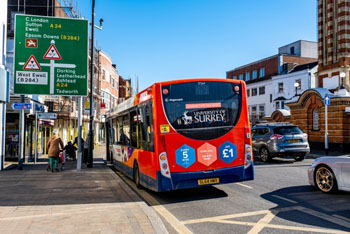The Government’s policy of asking local authorities to compete for local transport funding is producing the same winners and ‘perennial’ losers, campaigners have said.
Campaign for Better Transport (CfBT) said new analysis has highlighted how the process is disadvantaging rural local authorities and failing rural communities.

Surrey County Council received no BSIP cash
It said this is consistently producing the same winners and losers and that the Government’s most recent funding for local bus services, further compounded the problem with the perennial losers missing out yet again.
Director of policy and research Silviya Barrett said: ‘Our analysis has uncovered a painful truth, that the Government’s policy of asking local authorities to compete for local transport funding is producing the same winners and losers time and again. This shouldn’t be the case.
‘All communities deserve a reliable, regular and affordable bus service. To ensure this happens, the Government must move away from this fragmented and competitive way of funding and replace it with a long-term funding settlement for all transport authorities.’
CfBT said it analysed allocations of sustainable transport funding from central government for local transport authorities over the last decade, including the Local Sustainable Transport Fund, Transforming Cities Fund, Access Fund, Active Travel Fund, Zero Emission Bus Regional Areas (ZEBRA) scheme and the recent Bus Service Improvement Plan funding (BSIPs).
It said this found that combined mayoral authorities with large, experienced transport teams, and urban unitary or county councils that already have high levels of ambition and a history of investing in sustainable transport, are receiving the bulk of Government funding.
This means more rural unitary and county councils are repeatedly losing out, despite often needing more support to overcome greater barriers to providing a good bus network such as a more dispersed population and a lower return on investment due to lower passenger numbers than more urban areas.
CfBT called for an end to fragmented and competitive funding, and for money to be reallocated from carbon intensive transport, like road building, into a single funding pot for all local authorities so that all areas can achieve a decent level of provision.